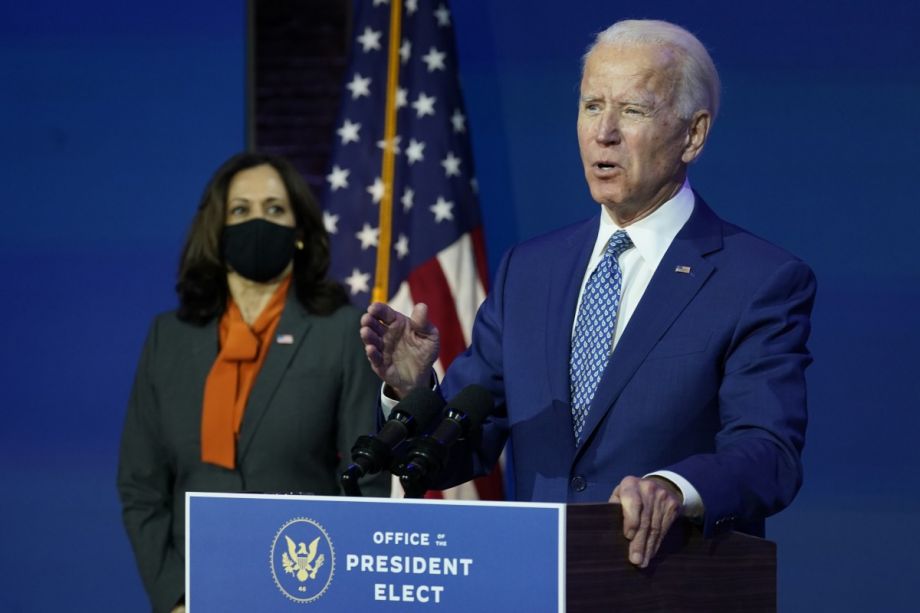Cities did this.
It started like a close but not too close murmur, like the sound of a public pool down the street in a non-pandemic summer. Then the banging of pots and pans, recalling the seven o’clock routine from the early peak of the pandemic, celebrating healthcare workers at change of shift.
It’s not quite over just yet, but in cities across the country, a collective celebration broke out over Saturday morning’s news about the results of the presidential election. For days prior, people were captivated by voting maps and coverage that showed voters in cities like Milwaukee, Detroit, Atlanta and Philadelphia having the final word. The president who cut their federal funding and then blamed their mayors for running them into the ground, who called them “anarchist jurisdictions,” lost.
And cities had help. A look at the electoral map of Arizona shows that sparsely populated rural areas helped flip the key swing state to vote Democrat, thanks to Native American voters and the organizers who got them registered in time and to the polls on election day — even on horseback.
The work isn’t finished. The U.S. Senate still hangs in the balance, with a rare double run-off election for both of Georgia’s senate seats, on January 5. Without knowing whether there will be a divided government come January 20, when President-elect Joe Biden is sworn into office, it’s impossible to predict whether he’ll have to compromise with a Senate led by an opposition party or his own party. But even within his own party, there are significant differences in perspective that he’d need to navigate, starting with who he’ll be appointing to his cabinet and key sub-cabinet positions.
Here are the presidential appointments we’ll be watching closely over the next few months for what they might say about the future of community and economic development in cities.
Housing and Urban Development
The Biden-Harris transition website has “racial equity” as one of four priority areas for the incoming administration. That includes a housing plan that “makes bold investments in homeownership and access to affordable housing for Black, Brown and Native Families.”
A future HUD secretary will of course have the opportunity to influence how that plan unfolds. Under the last Democratic presidency, even investments in public housing depended largely on bringing in the private sector, through the Rental Assistance Demonstration program. Also known as RAD, the program allows local public housing authorities to convert public housing units into Section 8 rental assistance program units, but offers plenty of leeway in how that conversion happens, leading to mixed results.
In San Francisco, under RAD the local housing authority turned its units over to established community-based organizations with decades of goodwill and experience serving residents. Elsewhere, private developers have taken over and started evicting residents at unprecedented rates, raising alarm and questions about process.
The HUD secretary will also have the opportunity to influence how the federal government handles distressed mortgages in a foreclosure crisis that is looking likelier by the week. Under the Obama Administration, HUD, Fannie Mae and Freddie Mac got into the habit of selling distressed mortgages — those at least one year behind in payments — to private equity firms. From 2010-2016, HUD alone sold 116,000 distressed mortgages to private equity firms, turning some of them into the largest single-family residential landlords in the country.
One thing is more than likely at this point — the future HUD secretary will almost certainly restore the Affirmatively Furthering Fair Housing Rule and process set up under the Obama Administration and gutted under the Trump administration.
Treasury Secretary
The most immediate priority that comes to mind will be the powers given the Treasury secretary under the CARES Act to shape emergency financial relief programs in conjunction with the Federal Reserve.
Under the Municipal Liquidity Facility, the Federal Reserve has offered to make up to $500 billion in short-term financing available to state and local governments and agencies around the country. But so far, the facility has made just two loans — one to the state of Illinois, and one to New York City’s Metropolitan Transportation Authority. The hangup has been the terms — the facility is charging rates above what basically every other state and local government or agency can get from the market, a decision that the Treasury secretary could help to change.
The HEROES Act, the relief package passed by the House in October, contains a provision to lower the Municipal Liquidity Facility’s rate to 0.25 percent and increase its borrowing terms up to ten years. Others are calling for the Fed to make zero-interest loans available to state and local governments on an ongoing basis, beyond emergency situations.
Similarly, the Fed’s Main Street Lending Program has promised up to $600 billion in emergency loans for businesses with up to 15,000 employees. But so far just a few hundred businesses have borrowed around $4 billion from the program.
Again, the terms have been the culprit, leaving out many businesses that might be interested in accessing the Main Street Lending Program. When first announced, the program’s minimum loan size was $1 million. With much pushing from members of Congress, responding to their constituents, it’s been lowered three times since, down to $100,000 as of October 30. The next Treasury secretary could help sway the Fed to eliminate the minimum entirely.
Looking further down the road, the Biden-Harris’ Administration’s pick for Treasury Secretary will also say something about the existing policy proposals floating around in Congress that it wants to support, especially policies that would have significant influence on cities.
Senator Elizabeth Warren, floated by progressives as a favored Treasury Secretary, seems to be a longshot at this point. But among her own legislative priorities, she introduced the “Stop Wall Street Looting Act,” seeking to rein in private equity firms from a consistent pattern of taking over healthy corporations and running them into the ground, causing significant job losses for cities.
The future Treasury Secretary will also have the opportunity to influence legislation and potential implementation of a more robust system to monitor and enforce accountability around Opportunity Zones. The Biden-Harris transition website already notes that reforming Opportunity Zones will be a priority. There were earlier drafts of Opportunity Zones legislation containing more robust monitoring and accountability measures, but those were lost in the final version passed as part of the Tax Cuts and Jobs Act at the end of 2017.
With its pick for Treasury Secretary, the Biden-Harris transition team could also signal its relative openness to the idea of state-owned or municipal-owned banks. Congresswomen Alexandria Ocasio-Cortez and Rashida Tlaib — both members of the House Financial Services Committee that oversees the Treasury Department — recently introduced the “Public Banking Act,” which would make a range of reforms that would complement and ease efforts around the country to create state-owned or municipal-owned banks.
Right now only North Dakota owns its own bank, as well as the Territory of American Samoa, but there are active efforts in dozens of cities and states, including California, New Jersey, New York and electoral lynchpin Philadelphia. But even without the Public Banking Act, new city-or state-owned banks would require intense coordination with the Treasury Department to get necessary clarity on a number of issues, including deposit insurance and access to the Federal Reserve.
Comptroller of the Currency
Speaking of banks, the Biden-Harris Administration will come in with a rare opportunity at the beginning of a Presidency to appoint a new Comptroller of the Currency.
The Office of the Comptroller of the Currency charters, regulates and supervises nearly 1,200 banks, federal savings associations, and branches of foreign banks that account for approximately 70 percent of all banking business in the United States. The Comptroller is appointed by the President with Senate confirmation to a five-year term, but previous Comptroller Joseph Otting resigned from his office in the spring, leaving the agency with only an acting Comptroller until now.
Otting’s resignation came immediately upon completing an overhaul of regulations around the Community Reinvestment Act, a Civil Rights Era anti-redlining law that affects the annual flow of billions of dollars in mortgages, small businesses loans and community development financing to low and moderate income communities across the country. Bank watchdog groups and community development advocates decried the overhaul as a giveaway to big banks, encouraging them to get credit for complying with the law by financing stadiums or large infrastructure projects with little to no direct benefit to low- and moderate-income communities, while reducing incentives for the traditional Community Reinvestment Act activities such as home mortgages, small business lending and community development financing.
The banking industry meanwhile has mostly been outwardly concerned with an unprecedented situation of having two sets of rules for the Community Reinvestment Act. The Office of the Comptroller of the Currency shares responsibility for enforcing the law with the Federal Reserve and the FDIC, and they have used one shared set of regulations to enforce the law, until now. The Federal Reserve recently kicked off its own regulatory update process, receiving a cautiously optimistic response from all sides so far. All agree some kind of update is necessary, as the last major overhaul of Community Reinvestment Act regulations occured in 1995. It is possible that the next Comptroller of the Currency elects to join the Federal Reserve’s update process, bringing all three agencies back into harmony.
It should be noted, the point person at the Federal Reserve for the Community Reinvestment Act has been Federal Reserve Board of Governors Member Lael Brainard, now rumored to be a top candidate to become Treasury Secretary under the incoming Biden-Harris Administration.
Others to watch
There’s a few other appointments with some well-known as well as not-as-well known potential impact on cities. The Small Business Administration’s shortcomings with regard to reaching communities of color and women were on full display this year, thanks to the Paycheck Protection Program. But for nearly a decade now, the SBA has had the Community Advantage Program running as a small “pilot” program to allow small nonprofits to make SBA-guaranteed small business loans to communities they work closely with, including Black communities and immigrant and refugee communities. The next SBA administrator could prioritize making the program permanent.
The next Labor Secretary could bring back wage theft enforcement as a priority. Under the Obama Administration, the department’s Wage and Hour Division at times recovered more than $700,000 in stolen wages a day. The Trump Administration was still stripping away the tools it had to enforce wage theft laws as of this past summer.
Ever heard of the Economic Development Administration? If your city has a revolving loan fund for small businesses, it’s likely the funds came from this relatively obscure arm of the Department of Commerce. The City of Berkeley recently tweaked the rules for its EDA-funded small business revolving loan fund rules, making it more friendly for worker-owned cooperative businesses and paving the way for other cities to do the same for their EDA-funded revolving loan funds. The Biden-Harris transition team has an opportunity with its Secretary of Commerce choice to signal whether worker-ownership can be a key element of an equitable recovery or continue to be something relegated to the margins.
Community and economic development are just one part of the picture. There’s criminal justice and incarceration, education, health and more. If the past four years have reminded cities of anything, it’s that progress is never guaranteed. Even with an incoming Biden-Harris Administration, even with a potential Democratic majority in Congress, the ideas and causes that Black, indigenous and other people of color are organizing around in cities aren’t guaranteed to have the influence that their votes appear to demand.
These next few months will reveal much about whether the Biden-Harris Administration’s plan for cities starts with ideas shaped by the lived experience of Black, indigenous and other people of color in cities, as opposed to ideas that reflect a disregard or discounting of their lived experience.
This article is part of The Bottom Line, a series exploring scalable solutions for problems related to affordability, inclusive economic growth and access to capital. Click here to subscribe to our Bottom Line newsletter.

Oscar is Next City's senior economic justice correspondent. He previously served as Next City’s editor from 2018-2019, and was a Next City Equitable Cities Fellow from 2015-2016. Since 2011, Oscar has covered community development finance, community banking, impact investing, economic development, housing and more for media outlets such as Shelterforce, B Magazine, Impact Alpha and Fast Company.
Follow Oscar .(JavaScript must be enabled to view this email address)


















